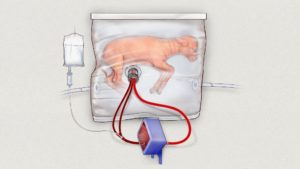
Courtesy Children’s Hospital of Philadelphia
An artificial womb that has been tested on fetal lambs has gotten quite a bit of attention in the past week. (The end of April 2017, that is.) Researchers at Children’s Hospital of Philadelphia have used the device on eight fetal lambs and found that they have grown relatively normally for a month in the artificial womb.
Articles also have gotten around on social media, with quite a few people posting their reactions. My news feed has people raising medical and ethical questions as well as saying this is creepy like “A Brave New World” or “The Matrix.” As the dad of a micro preemie who was born at 22 weeks and 6 days of gestation (and who’s trying to publish a book on the topic) I thought I’d weigh in with several observations.
- It’s ok to feel bad for the baby lamb, as the c-section was unnecessary, and the experiment wasn’t meant to be survivable for it.
- People have been upset because it seems like it’s playing God, that machines could be preferable to a woman’s womb. This is a valid concern, but if that ever becomes possible, it won’t be for a couple more centuries. In the nearer future, it might be used on micropreemies such as our son. The main benefit of the machine would be that it would allow them to grow without using their lungs to breathe for a few weeks, and it would allow their hearts to put less oxygen in to their blood, which is better for development of eyes at that stage.
- Is this is an ethical path to walk down? I think so. We certainly would have liked some more choices than the grumpy doctor who started by saying he wouldn’t try to save Gabriel with a ventilator as he was too immature. That doctor eventually changed his mind and did save our son, and we later wrote an article for the Journal of Pediatrics on better ways to approach this dilemma.
- However, there are several ethical questions with how such an artificial womb could be used. Neonatologists, when faced with a baby born at a stage when survival is questionable, are supposed to act in the best interests of the child with (hopefully) the informed consent of the parents. This means that before doctors could try using an artificial womb, they would have to believe that there’s a good chance the treatment could help, and that the treatment would not cause unbearable suffering. Doctors should not provide futile care. That is, if the doctors say, “This baby’s a goner, but we could experiment on him in the artificial womb to see if we can get useful data for a couple days,” they are not allowed to provide the treatment.
- So what about the long-term consequences? Yes, disabilities are a strong possibility for these babies. But, with neonatal care now, it’s rare for someone to survive and grow up in a miserable state in which the pain and suffering on them and/or the burden on the family is so huge that they’re wishing they hadn’t survived. The far more common outcomes are that the parents adjust to life with a child with a disability, or the baby simply doesn’t survive for more than a couple of weeks in the NICU. Or, in the case of our micro preemie, he came out with minimal impairment for reasons nobody really understands.
- Is this going to be the thing that revolutionizes micro preemie care? Actually, I hope not. A far better solution would be to figure out what causes pre-term labor and provide treatments to the mother to prevent it. Only 25 to 30 percent of preterm births can be blamed on a known cause such as preeclampsia, placental previa or fetal growth restriction, according to the Institutes of Health, and the rest are a mystery. But that’s another super-complex problem.
In conclusion, this story about the baby lamb in the artificial womb does raise an assortment of questions and is indeed a little creepy. The part that’s actually relevant in our future is, what do doctors do when they have a machine that they think might be helpful? Neonatal treatment at the edge of viability causes harm in the short term, but doctors provide it in hopes it will add up to a greater benefit.
When they’re thinking about the first baby to go in the artificial womb, will it be worth the chance?
Here are some additional articles in the news media on the topic:
National Public Radio, “Scientists Create Artificial Womb That Could Help Prematurely Born Babies.”
CNN, “Scientists Create Artificial Womb”
The Atlantic, “Babies Floating in Fluid-Filled Bags”
Children’s Hospital of Philadelphia press release, “A Unique Womb-Like Device Could Reduce Mortality and Disability for Extremely Premature Babies.”
Lastly, here’s a video created by Children’s Hospital of Philadelphia:
